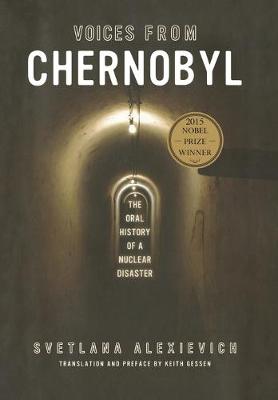As much as I hate to say when SKY UK’s Chernobyl aired, I remembered I had this sitting on my shelf, and I finally dusted it off and started to read, before I watched any of the series. I’m so glad I did because so many of the oral histories recounted in Voices from Chernobyl influenced the narrative of the series – and as confronting as the series was, I’m not ashamed to say that I cried in public, tears streaming down my face reading those histories in the words of those who experienced them. Every emotion was represented. There was sadness, hope, anger, resignation…it was an emotional roller coaster that left me weeping at the tragedy of it all.
Soldiers came for us in cars. I thought the war had started. They were saying these things: “deactivation,” “isotopes.” One soldier was chasing after a cat. The dosimeter was working on the cat like an automatic: click, click. A boy and a girl were chasing the cat, too. The boy was all right, but the girl kept crying, “I won’t give him up!” She was yelling: “Run away, run little girl!” But the soldier had a big plastic bag.I was amazed at the skill Alexievich showed in getting to the emotional heart of her subjects. She conveyed their voices with precision and depth. She began and ended the collection with the two most gut-wrenching tales – tales of wives who lost their husbands and the pain they had to endure. It drew me in and ensured that all these stories would linger in my mind, quite possibly for the rest of my life.
It’s easy to look at stories from history and forget that they happened to real people. Some stories are so fantastical, and take on such an air of mythology that they become almost hyper-real. We forget to step back and really think about why, how, and to whom these events occurred. Voices from Chernobyl reminds us that Chernobyl is much more than a thrill-seeker’s theme park. It’s a place where lives were lived, memories were made, and people destroyed.
The sparrows disappeared from our town in the first year after the accident. They were lying around everywhere – in the yards, on the asphalt. They’d be raked up and taken away in the containers with the leaves. They didn’t let people burn the leaves that year, because they were radioactive, so they buried the leaves.Voices from Chernobyl offers very little context or background. This works in its favour. The stories speak for themselves. The reality is, the people telling the stories were just as much in the dark (in fact, more so!) than a reader would be, and so it makes it all the more impactful to hear their stories without comment.
The sparrows came back two years later. We were so happy, we were calling to each other: “I saw a sparrow yesterday! They’re back.”
The May bugs also disappeared, and they haven’t come back. Maybe they’ll come back in a hundred years or a thousand. That’s what our teacher says. I won’t see them.
Voices from Chernobyl isn’t a book about politics or global impact. It’s an intimate monologue, recording the life of the citizens who were most deeply affected by the Chernobyl disaster. If you don’t shed a tear reading some of these accounts, you don’t have a heart. I can’t recommend this book highly enough.
